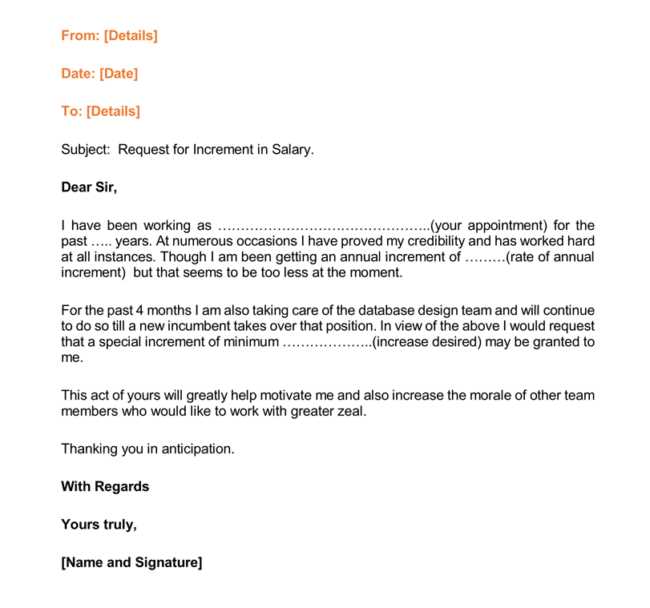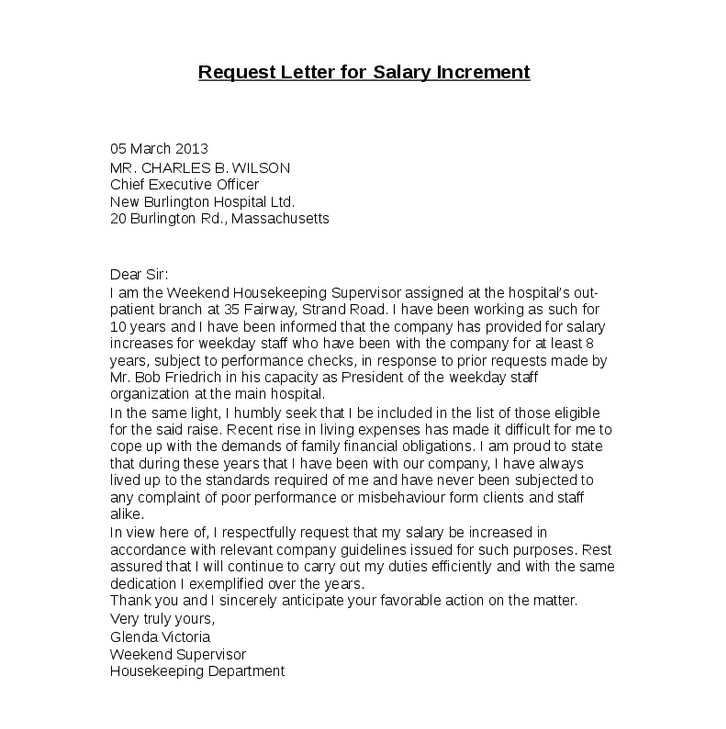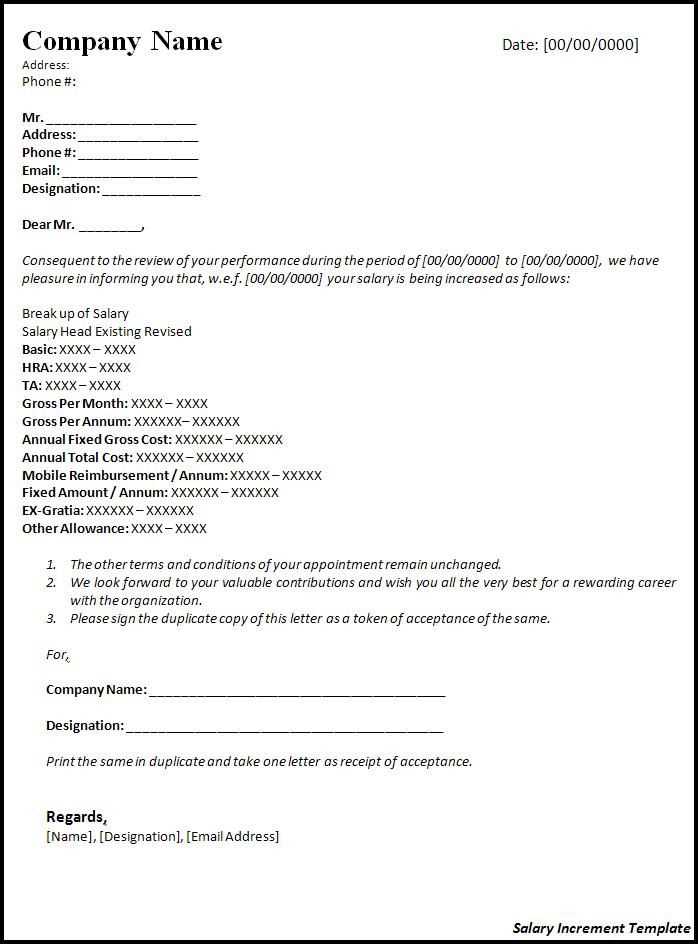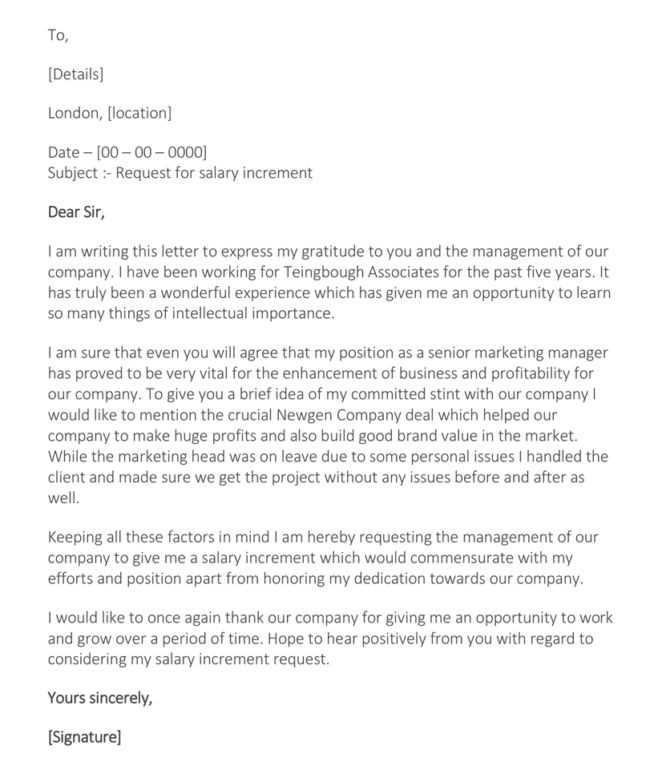How to Write a Pay Raise Letter Template

Asking for a salary adjustment can be a daunting task, but with the right approach, it can lead to positive results. Crafting a well-structured and respectful request is key to demonstrating your value and making your case effectively. Knowing how to communicate your achievements and reasons for the request can set you apart in the process.
Clear communication is essential when addressing this topic with your employer. It’s important to express your dedication, highlight your contributions, and back up your request with solid evidence of your growth within the company. A well-thought-out approach not only shows professionalism but also reflects confidence in your work and your future potential.
By following a few simple guidelines, you can ensure that your request is both impactful and considerate. This will help you stand out and increase the likelihood of a favorable outcome, no matter the outcome of the conversation.
Understanding the Salary Adjustment Request Process
Requesting an increase in compensation is an important step in advancing your career and ensuring that your work is valued appropriately. The process requires careful planning and timing to increase the chances of a successful outcome. It’s not just about asking for more money, but demonstrating your growth, commitment, and alignment with company goals.
Steps to Take Before Making the Request
Before initiating any conversation with your employer, it’s crucial to evaluate your performance and prepare a solid case. This involves collecting evidence of your achievements, understanding market trends for similar roles, and being clear on the value you bring to the team. The preparation phase is key to crafting a convincing and professional appeal.
Choosing the Right Time and Approach
Timing plays a significant role in this process. Requesting a salary adjustment at the wrong time can lead to a negative response. It’s important to choose a moment when your contributions are most visible and when the company is in a stable financial position. Additionally, your approach should be respectful and tactful, keeping the conversation focused on your performance rather than personal needs.
| Preparation Factor | Why It’s Important |
|---|---|
| Documenting Achievements | Provides solid evidence of your contributions and progress within the company. |
| Understanding Market Rates | Helps to ensure your request is in line with industry standards for similar roles. |
| Assessing Company Health | Knowing when the company is doing well financially increases the chances of success. |
Crafting a Professional Salary Increase Request

Writing a formal request for a compensation adjustment requires a blend of professionalism and clarity. The document should reflect your achievements, your dedication to the company, and the rationale behind your request. A well-crafted appeal increases the likelihood of a positive response from your employer.
Here are the key elements to include when constructing your request:
- Clear Introduction: Start by addressing your manager respectfully and stating the purpose of the communication.
- Evidence of Performance: Highlight your key achievements and contributions. Provide concrete examples of how you’ve added value to the team.
- Industry Comparison: Include data on industry standards for similar roles to support your case.
- Justification for the Request: Clearly explain why you believe a compensation adjustment is warranted, focusing on your performance and company growth.
- Polite Tone: Maintain a professional and courteous tone throughout the document, acknowledging the employer’s perspective.
Each of these components plays a vital role in demonstrating your professionalism and preparing a persuasive argument. Being concise yet comprehensive is crucial to creating a strong appeal.
Lastly, ensure that your request is formatted properly. A well-structured document demonstrates respect for your employer’s time and increases the chances of it being taken seriously. Keep the language formal, and avoid unnecessary jargon or emotional language.
Key Elements of an Effective Compensation Adjustment Request

For your request to be taken seriously, it must be well-structured, concise, and based on solid reasoning. A persuasive appeal goes beyond just asking for an increase; it provides a compelling case that demonstrates your value to the company. The following elements are essential for creating an effective and professional request.
- Introduction and Purpose: Start by clearly stating the purpose of the request. Address the recipient professionally and explain the reason for the document.
- Achievements and Contributions: Focus on your most significant contributions to the organization. Highlight specific projects or milestones where you’ve made an impact.
- Comparative Market Research: Provide evidence of industry standards for similar roles. This helps to justify your request with real data, showing that the adjustment aligns with current trends.
- Rationale for the Adjustment: Explain why you believe your performance warrants the requested adjustment. This could include increased responsibilities, consistent positive feedback, or measurable improvements in your role.
- Polite and Professional Tone: Throughout the document, maintain a respectful and courteous tone. Acknowledge the company’s circumstances while making your case for an increase.
By including these key elements in your request, you can present a well-rounded argument that demonstrates your worth to the company. Crafting your appeal with these details will not only show your professionalism but also increase the likelihood of a positive response.
Common Mistakes to Avoid in Your Request
When making a formal request for a compensation adjustment, the way you present your case is just as important as the content itself. Even the most well-intentioned appeal can fall short if certain errors are made. It’s essential to avoid common pitfalls that can undermine your credibility or weaken your argument.
- Lack of Specific Evidence: Failing to provide concrete examples of your contributions can make your request appear unfounded. Always back up your appeal with measurable achievements or specific instances where you’ve added value.
- Overly Emotional Language: While it’s natural to feel passionate about your request, using overly emotional language can detract from the professionalism of your appeal. Stick to the facts and maintain a calm, measured tone throughout.
- Ignoring Company Context: It’s crucial to understand the company’s current situation. Making a request without considering the financial health or business priorities of the organization may come across as out of touch.
- Unrealistic Expectations: Asking for an excessive increase without solid justification can harm your chances. Be sure that your request is reasonable and aligned with industry standards and company norms.
- Failure to Express Gratitude: Not acknowledging the opportunities you’ve had or expressing appreciation for the company’s support can give the wrong impression. Always thank your employer for considering your request.
By being mindful of these mistakes, you can ensure that your appeal is as professional and persuasive as possible. Taking the time to avoid these common errors can significantly improve your chances of achieving a positive outcome.
When is the Right Time to Ask

Timing plays a critical role when requesting a change in compensation. Asking for an increase at the wrong time can result in disappointment or an unfavorable response. To maximize your chances of success, it’s important to choose the right moment to present your case.
Consider the following factors when deciding when to make your request:
- Company Performance: If the company is experiencing financial difficulties, it may not be the best time to ask for a compensation adjustment. On the other hand, if the company is thriving and achieving its goals, it could be a perfect opportunity.
- Your Performance Review Cycle: Aligning your request with a scheduled performance review can be strategic. If your performance has been exceptional, this is the ideal moment to discuss your compensation.
- Completion of Major Projects: Successfully completing a major project or achieving a significant milestone can strengthen your case. Demonstrating how you’ve contributed to the organization’s success can provide solid justification for your request.
- Market Trends: Understanding industry trends and knowing if the typical salary for your role is increasing can help you time your request effectively. If market demand for your position is rising, it may be an opportune time to discuss your compensation.
By carefully considering these factors, you can make a well-timed and thoughtful appeal that is more likely to be met with a favorable response.
Tips for Negotiating Your Compensation Adjustment

Negotiating a salary adjustment is a critical skill that requires preparation, confidence, and strategy. Approaching the conversation with the right mindset can help ensure that you make your case effectively and achieve a positive outcome. Here are some key tips to help you navigate the negotiation process.
Do Your Research
Before entering into any discussion, it’s essential to gather data. Research industry standards for your role, salary trends, and typical compensation packages. This knowledge will provide you with a solid foundation to back up your request and ensure your expectations are aligned with the market.
Be Prepared to Discuss Your Value
Be ready to explain why you deserve an adjustment. Highlight your accomplishments, additional responsibilities, and contributions to the company. Demonstrating your ongoing commitment and the results you’ve delivered will make it easier for your employer to see the value in your request.
Additionally, consider what you’re willing to accept. Be clear on your goals but also remain open to alternative solutions, such as performance-based incentives or non-monetary benefits, in case the initial offer isn’t exactly what you expected.